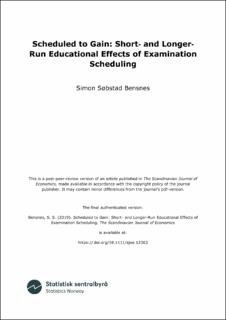| dc.contributor.author | Bensnes, Simon Søbstad | |
| dc.coverage.spatial | Norway | en_US |
| dc.date.accessioned | 2020-04-03T09:01:06Z | |
| dc.date.available | 2020-04-03T09:01:06Z | |
| dc.date.issued | 2019 | |
| dc.identifier.citation | The Scandinavian Journal of Economics. 2019 | en_US |
| dc.identifier.uri | https://hdl.handle.net/11250/2650234 | |
| dc.description.abstract | This article presents findings concerning the effect of examination timing on
high-stakes exam scores and longer-run outcomes. It shows that random variations in
exam schedules that increase the time students have to prepare have positive effects on
test scores. The effect is highly concave, and stronger for females and in quantitative
subjects. I trace the effects of preparation time into tertiary education outcomes,
fi nding signi cant effects for female students on the extensive and intensive margin.
The paper shows how easily exam scores and, consequently, longer-run outcomes are
affected by a random institutional factor unrelated to student ability. | en_US |
| dc.language.iso | eng | en_US |
| dc.publisher | Wiley | en_US |
| dc.rights | Attribution-NonCommercial-NoDerivatives 4.0 Internasjonal | * |
| dc.rights.uri | http://creativecommons.org/licenses/by-nc-nd/4.0/deed.no | * |
| dc.title | Scheduled to gain: short- and longer-run educational effects of examination scheduling | en_US |
| dc.type | Peer reviewed | en_US |
| dc.type | Journal article | en_US |
| dc.description.version | acceptedVersion | en_US |
| dc.subject.nsi | VDP::Samfunnsvitenskap: 200 | en_US |
| dc.source.journal | The Scandinavian Journal of Economics | en_US |
| dc.identifier.doi | 10.1111/sjoe.12363 | |

